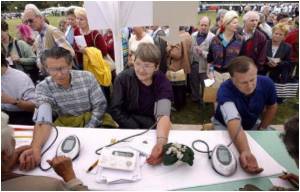A new invention by the University of Washington scientists will help people with motor disabilities to use the computer mouse easily.

The Pointing Magnifier combines an area cursor with visual and motor magnification, reducing need for fine, precise pointing. The UW's AIM Research Group, which invented the Pointing Magnifier, learned that users can much more easily acquire targets, even small ones, 23 percent faster with the Pointing Magnifier.
The magnifier runs on Windows-based computer systems. It replaces the conventional cursor with a larger, circular cursor that can be made even larger for users who have less motor control. To acquire a target, the user places the large cursor somewhere over the target, and clicks. The Pointing Magnifier then magnifies everything under that circular area until it fills the screen, making even tiny targets large. The user then clicks with a point cursor inside that magnified area, acquiring the target. Although the Pointing Magnifier requires two clicks, it's much easier to use than a conventional mouse, which can require many clicks to connect with a target.
Another AIM technology, the Angle Mouse, similarly helps people with disabilities. Like the Pointing Magnifier, it may be downloaded, and two videos, one for general audiences and another for academic ones, are available as well.
Jacob O. Wobbrock, an assistant professor in the Information School who leads the AIM Group, suggests that users try both the Pointing Magnifier and the Angle Mouse before deciding which they prefer.
"Our cursors make ubiquitous mice, touchpads, and trackballs more effective for people with motor impairments without requiring new, custom hardware," said Wobbrock.
Advertisement
The paper was presented at the 2010 User Interface Software and Technology symposium in New York.
Advertisement









